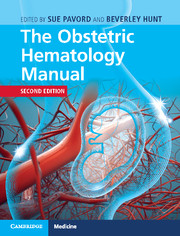Book contents
- The Obstetric Hematology Manual
- The Obstetric Hematology Manual
- Copyright page
- Dedication
- Contents
- Contributors
- Preface to the Second Edition
- Section 1 Physiological Changes in Pregnancy
- Section 2 Cytopenia
- Section 3 Inherited Red Cell Disorders
- Section 4 Fetal Maternal Alloimmune Syndromes
- Section 5 Thromboembolism and Anticoagulation
- Section 6 Thrombophilia and Fetal Loss
- Section 7 Hemorrhagic Disorders
- Section 8 Microangiopathies
- Section 9 Malignant Conditions
- Index
- References
Section 6 - Thrombophilia and Fetal Loss
Published online by Cambridge University Press: 01 February 2018
- The Obstetric Hematology Manual
- The Obstetric Hematology Manual
- Copyright page
- Dedication
- Contents
- Contributors
- Preface to the Second Edition
- Section 1 Physiological Changes in Pregnancy
- Section 2 Cytopenia
- Section 3 Inherited Red Cell Disorders
- Section 4 Fetal Maternal Alloimmune Syndromes
- Section 5 Thromboembolism and Anticoagulation
- Section 6 Thrombophilia and Fetal Loss
- Section 7 Hemorrhagic Disorders
- Section 8 Microangiopathies
- Section 9 Malignant Conditions
- Index
- References
- Type
- Chapter
- Information
- The Obstetric Hematology Manual , pp. 177 - 196Publisher: Cambridge University PressPrint publication year: 2018



